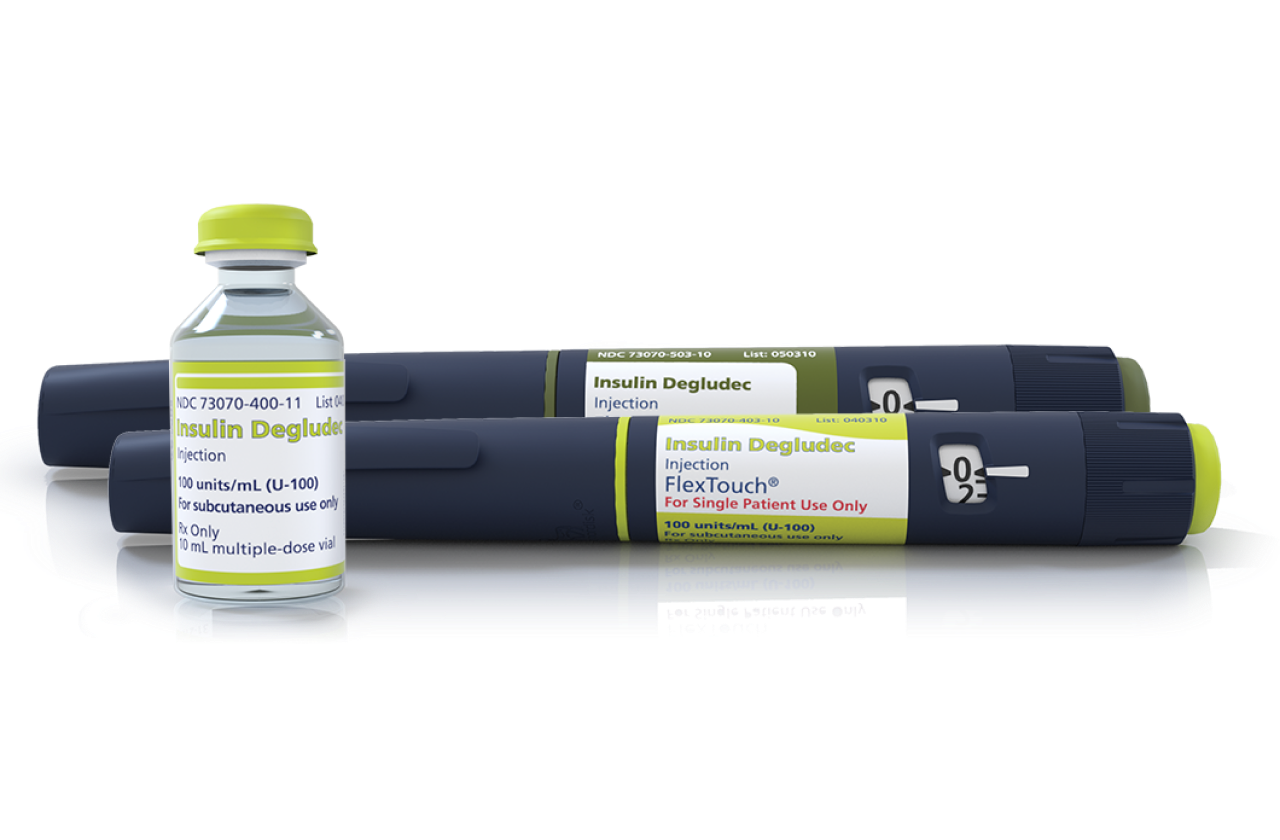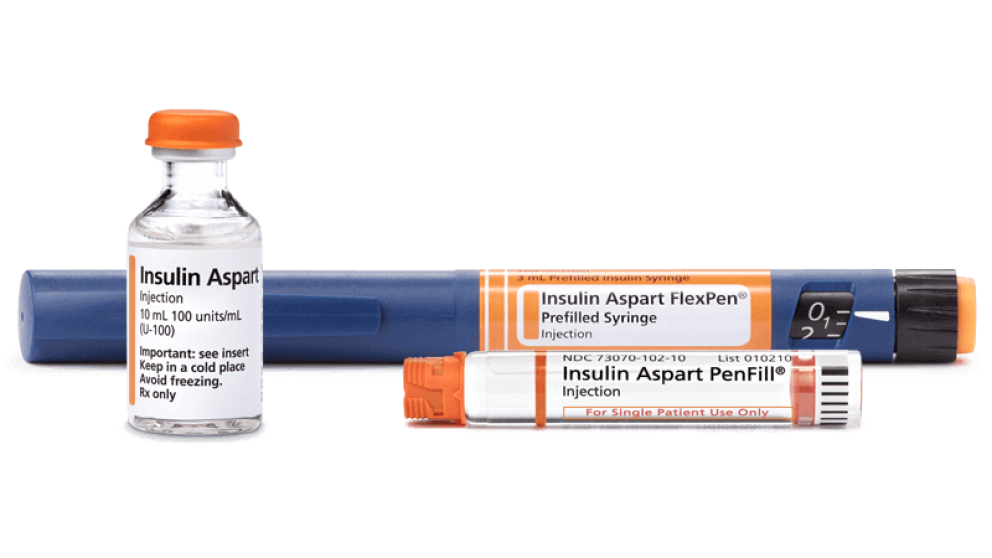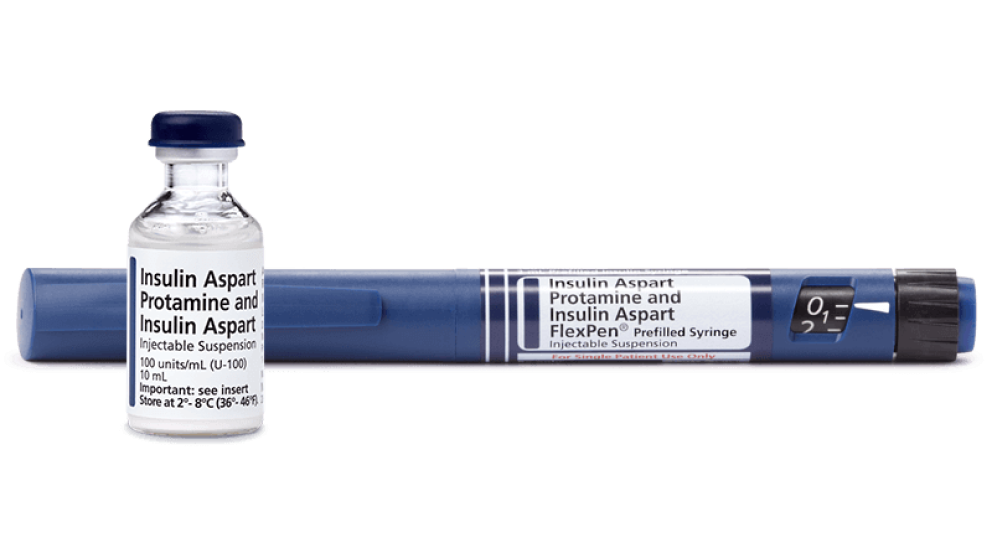Discontinuation Notice
Please be aware Novo Nordisk is providing more than one-year advance notice that all unbranded biologics distributed by Novo Nordisk Pharma, Inc. (NNPI) will be discontinued on December 31, 2025.
An unbranded biologic insulin is equivalent to its branded alternative. With the reduction in prices of our branded insulins, the need for these unbranded biologic products will become redundant. Novo Nordisk branded insulins will have the same, or lower, list prices than the unbranded biologics being discontinued. Speak with your healthcare professional about your treatment options to determine the best course of action, as coverage for alternative products may vary based on your insurance. Check with your insurance company to determine which treatment options are covered and what your out-of-pocket cost will be.
If you have any questions, please contact your Healthcare Provider or call the Novo Nordisk Customer Care Center at 1-(800)-727-6500.


For those who need help affording their insulin
Unbranded Biologics of Novo Nordisk-branded analog insulins are available at a reduced list price from Novo Nordisk Pharma, Inc. (NNPI), a Novo Nordisk A/S company. Insulin Degludec Injection 100 U/mL, 200 U/mL, Insulin Aspart Injection 100 U/mL, and Insulin Aspart Protamine and Insulin Aspart Injectable Suspension Mix 70/30 100 U/mL Unbranded Biologics can be ordered from any pharmacy in the United States and should be available in 1 to 3 days.
NNPI offers 3 insulin products



Insulin Degludec Injection Indication and Important Safety Information
What is insulin degludec?
- Prescription insulin degludec is a long-acting insulin used to control high blood sugar in adults and children who are 1 year of age and older with diabetes. This product is Tresiba® (insulin degludec).
- Insulin degludec is not for people with diabetic ketoacidosis (increased ketones in the blood or urine)
- It is not known if insulin degludec is safe and effective in children under 1 year of age
- Insulin degludec is available in 2 concentrations: 200 units/mL and 100 units/mL
Important Safety Information
Do not share your insulin degludec FlexTouch® with other people, even if the needle has been changed. Do not share needles or syringes with another person. You may give other people a serious infection, or get a serious infection from them.
Who should not take insulin degludec?
Do not take insulin degludec if you:
- are having an episode of low blood sugar (hypoglycemia)
- have an allergy to insulin degludec or any of the ingredients in insulin degludec
Before taking insulin degludec, tell your health care provider about all your medical conditions, including if you are:
- pregnant, planning to become pregnant, or are breastfeeding
- taking new prescription or over-the-counter medicines, vitamins, or herbal supplements
Talk to your health care provider about low blood sugar and how to manage it.
How should I take insulin degludec?
- Read the Instructions for Use and take insulin degludec exactly as your health care provider tells you to
- Do not do any conversion of your dose. The dose counter always shows the selected dose in units
- Know the type and strength of insulin you take. Do not change the type of insulin you take unless your health care provider tells you to
- Adults - If you miss or are delayed in taking your dose of insulin degludec:
- Take your dose as soon as you remember, then continue with your regular dosing schedule
- Make sure there are at least 8 hours between doses
- If children miss a dose of insulin degludec:
- Call the healthcare provider for information and instructions about checking blood sugar levels more often until the next scheduled dose of insulin degludec
- For children who need less than 5 units of insulin degludec each day, use an insulin degludec U-100 vial
- Check your blood sugar levels. Ask your health care provider what your blood sugar levels should be and when you should check them
- Do not reuse or share your needles or syringes with other people. You may give them a serious infection, or get a serious infection from them
- Never inject insulin degludec into a vein or muscle
- Never use a syringe to remove insulin degludec from the FlexTouch® pen
- Insulin degludec can be injected under the skin (subcutaneously) of your upper legs (thighs), upper arms, or stomach area (abdomen).
- Change (rotate) your injection sites within the area you choose with each injection to reduce your risk of getting lipodystrophy (pits in skin or thickened skin) and localized cutaneous amyloidosis (skin with lumps) at the injection sites.
- Do not use the exact same spot for each injection.
- Do not inject where the skin has pits, is thickened, or has lumps.
- Do not inject where the skin is tender, bruised, scaly or hard, or into scars or damaged skin.
What should I avoid while taking insulin degludec?
- Do not drive or operate heavy machinery, until you know how insulin degludec affects you
- Do not drink alcohol or use prescription or over-the-counter medicines that contain alcohol
What are the possible side effects of insulin degludec?
Insulin degludec may cause serious side effects that can be life-threatening, including:
- Low blood sugar (hypoglycemia). Signs and symptoms that may indicate low blood sugar include dizziness, light-headedness, sweating, confusion, headache, blurred vision, slurred speech, shakiness, fast heart beat, anxiety, irritability, mood changes, and hunger.
- Low potassium in your blood (hypokalemia)
- Heart failure in some people if taken with thiazolidinediones (TZDs). This can happen even if you have never had heart failure or heart problems. If you already have heart failure, it may get worse while you take TZDs with Insulin degludec. Tell your health care provider if you have any new or worse symptoms of heart failure including shortness of breath, tiredness, swelling of your ankles or feet, and sudden weight gain
Your insulin dose may need to change because of change in level of physical activity or exercise, increased stress, change in diet, weight gain or loss, or illness.
- Common side effects may include serious allergic reactions (whole body reactions), reactions at the injection site, skin thickening or pits at the injection site (lipodystrophy), itching, rash, swelling of your hands and feet, and weight gain.
Get emergency medical help if you have trouble breathing, shortness of breath, fast heartbeat, swelling of your face, tongue, or throat, sweating, extreme drowsiness, dizziness, or confusion.
Please click here for Insulin Degludec Prescribing Information.
Insulin Aspart Injection Indications and Usage
What is insulin aspart injection?
- Insulin aspart is a man-made insulin used to control high blood sugar in adults and children with diabetes mellitus.
Important Safety Information
Do not share your insulin aspart FlexPen®, insulin aspart FlexTouch®, PenFill® cartridge or PenFill® cartridge compatible insulin delivery device with other people, even if the needle has been changed. You may give other people a serious infection, or get a serious infection from them.
Who should not take insulin aspart?
Do not take insulin aspart if:
- your blood sugar is too low (hypoglycemia) or you are allergic to any of its ingredients.
Before taking insulin aspart, tell your health care provider about all your medical conditions including, if you are:
- pregnant, plan to become pregnant, or are breastfeeding.
- taking new prescription or over-the-counter medicines, including supplements.
Talk to your health care provider about how to manage low blood sugar.
How should I take insulin aspart?
- Read the Instructions for Use and take exactly as directed.
- Insulin aspart is fast-acting. Eat a meal within 5 to 10 minutes after taking it.
- Know the type and strength of your insulin. Do not change your insulin type unless your health care provider tells you to.
- Check your blood sugar levels. Ask your health care provider what your blood sugar levels should be and when you should check them.
- Do not reuse or share your needles with other people. You may give other people a serious infection, or get a serious infection from them.
- Change (rotate) your injectionsites within the area you choose with each injection to reduce your risk of getting lipodystrophy (pits in skin or thickened skin) and localized cutaneous amyloidosis (skin with lumps) at the injection sites.
- Do not use the exact same spot for each injection.
- Do not inject where the skin has pits, is thickened, or has lumps.
- Do not inject where the skin is tender, bruised, scaly or hard, or into scars or damaged skin.
What should I avoid while taking insulin aspart?
- Do not drive or operate heavy machinery, until you know how insulin aspart affects you.
- Do not drink alcohol or use medicines that contain alcohol.
What are the possible side effects of insulin aspart?
Serious side effects can lead to death, including:
Low blood sugar. Some signs and symptoms include:
- anxiety, irritability, mood changes, dizziness, sweating, confusion, and headache.
Your insulin dose may need to change because of:
- weight gain or loss, increased stress, illness, or change in diet or level of physical activity.
Other common side effects may include:
- low potassium in your blood, injection site reactions, itching, rash, serious whole body allergic reactions, skin thickening or pits at the injection site, weight gain, and swelling of your hands and feet and if taken with thiazolidinediones (TZDs) possible heart failure.
Get emergency medical help if you have:
- trouble breathing, shortness of breath, fast heartbeat, swelling of your face, tongue, or throat, sweating, extreme drowsiness, dizziness, or confusion.
Please click here for Insulin Aspart Prescribing Information.
Insulin Aspart Protamine and Insulin Aspart Injectable Suspension Mix 70/30 Indications and Usage
What is insulin aspart protamine and insulin aspart injectable suspension?
- insulin aspart protamine and insulin aspart is a man-made insulin used to control high blood sugar in adults with diabetes mellitus.
- It is not known if insulin aspart protamine and insulin aspart is safe or effective in children.
Important Safety Information
Do not share your insulin aspart protamine and insulin aspart FlexPen® with other people, even if the needle has been changed. Do not share needles or syringes with another person. You may give other people a serious infection, or get a serious infection from them.
Who should not use insulin aspart protamine and insulin aspart?
- Do not use insulin aspart protamine and insulin aspart if your blood sugar is too low (hypoglycemia) or you are allergic to any of its ingredients.
Before taking insulin aspart protamine and insulin aspart, tell your healthcare provider about all your medical conditions including, if you are:
- pregnant, planning to become pregnant, or are breastfeeding.
- taking new prescription or over-the-counter medicines, including supplements.
Talk to your health care provider about how to manage low blood sugar.
How should I take insulin aspart protamine and insulin aspart?
- Read the Instructions for Use and take exactly as directed.
- Insulin aspart protamine and insulin aspart starts acting fast. If you have type 1 diabetes, inject within 15 minutes before you eat a meal. If you have type 2 diabetes, inject within 15 minutes before or after starting your meal.
- Do not mix insulin aspart protamine and insulin aspart with other insulin products or use in an insulin pump.
- Know the type and strength of your insulin. Do not change your insulin type unless your health care provider tells you to.
- Check your blood sugar levels. Ask your health care provider what your blood sugar levels should be and when you should check them.
- Do not reuse or share your needles or syringes with other people. You may give other people a serious infection, or get a serious infection from them.
- Change (rotate) your injection sites within the area you choose with each injection to reduce your risk of getting lipodystrophy (pits in skin or thickened skin) and localized cutaneous amyloidosis (skin with lumps) at the injection sites.
- Do not use the exact same spot for each injection.
- Do not inject where the skin has pits, is thickened, or has lumps.
- Do not inject where the skin is tender, bruised, scaly or hard, or into scars or damaged skin.
What should I avoid while taking insulin aspart protamine and insulin aspart?
- Do not drive or operate heavy machinery, until you know how insulin aspart protamine and insulin aspart affects you.
- Do not drink alcohol or use medicines that contain alcohol.
What are the possible side effects of insulin aspart protamine and insulin aspart?
Serious side effects can lead to death, including:
Low blood sugar. Some signs and symptoms include:
- anxiety, irritability, mood changes, dizziness, sweating, confusion, and headache.
Your insulin dose may need to change because of:
- weight gain or loss, increased stress, illness, or change in diet or level of physical activity.
Other common side effects may include:
- low potassium in your blood, injection site reactions, itching, rash, serious whole body allergic reactions, skin thickening or pits at the injection site, weight gain, and swelling of your hands and feet and if taken with thiazolidinediones (TZDs), possible heart failure.
Get emergency medical help if you have:
- trouble breathing, shortness of breath, fast heartbeat, swelling of your face, tongue, or throat, sweating, extreme drowsiness, dizziness, or confusion.
Please click here for Insulin Aspart Protamine and Insulin Aspart Injectable Suspension Mix 70/30 Prescribing Information.
